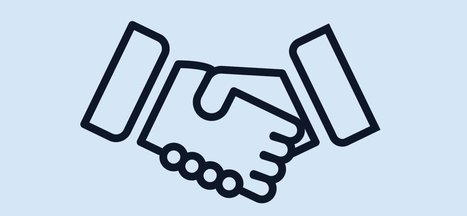 Your new post is loading...
 Your new post is loading...
Children’s brains develop in spurts called critical periods. The first occurs around age 2, with a second one occurring during adolescence. At the start of these periods, the number of connections (synapses) between brain cells (neurons) doubles. Two-year-olds have twice as many synapses as adults. Because these connections between brain cells are where learning occurs, twice as many synapses enable the brain to learn faster than at any other time of life. Therefore, children’s experiences in this phase have lasting effects on their development.
Via John Evans
"Technology is having an impact on children’s handwriting ability. So what does this mean for learning and development? ..."
Via Leona Ungerer
You’ve probably been taught that giving compliments build relationships. In the self-help classic How to Win Friends and Influence People, Dale Carnegie stressed the importance of “giving sincere and honest appreciation” to others in life and work. He’s not wrong, but the thing is that showing real appreciation is difficult to do. How many times has someone given you a “compliment” and you just know they’re trying to get something from you? Compliments can easily veer into flattery and feel insincere, leaving the recipient wondering about the giver’s hidden agenda. Here’s what it takes to avoid all that–it’s easier than you think.
Via The Learning Factor
Learning new things is an important part of career growth, and 87% of millennials say professional development opportunities factor into their job decisions, according to Gallup. Acquiring too much information, however, can be a problem, putting your career at risk of becoming stagnant, says Dom Price, work futurist-in-chief and head of R&D at the software development firm Atlassian in Sydney, Australia. “In the digital world, we’re privy to an abundance of knowledge,” he says. “We believe getting smart means knowing more, but in fact, it is not. We’re not practicing what we know. The acquisition of knowledge is dangerous when you don’t practice it.” In order to succeed, Price argues that you need to understand the importance of unlearning—identifying the things you know that you don’t have time to nurture, and then letting some of them go.
Via The Learning Factor
It’s that time of year when many of us get motivated to make ourselves better—healthier, wealthier, wiser, or just different—in the new year. Roughly six in 10 of us make New Year’s resolutions, according to a 2016 Harris poll. But following through on those goals isn’t easy. Roughly half of those who are earnestly vowing to make improvements in 2018 are likely dusting off the same list they had last year. So if you want to actually accomplish those goals—or at least make a dent in them—by this time next year, use these five approaches.
Via The Learning Factor
What do people want out of work? More than money, more than benefits, much more than job security, a recent survey says, they want to be treated with respect. If that sounds like you, how can you increase the respect you get each day at work? It turns out that there are specific habits you can cultivate that allow you to train the people you work with to treat you respectfully each day. Here are 33 of these proven habits that can help, if you're willing to stick with them. Implement a few, take inspiration from the others, and you'll likely see dividends quickly.
Via The Learning Factor
Companies want to be profitable and maximize their performance and impact both in the world and within their industry. With that said, accomplishing those feats starts with cultivating a culture to allow those things to happen which starts with a priority on employee well-being. Culture is important -- it affects engagement, mindset, reputation, recruitment of talent, and well being. When looking to cultivate a healthy and high performing culture, start by emphasizing these six points:
Via The Learning Factor, Mark E. Deschaine, PhD, Bobby Dillard
We might spend days, months, or even years trying to figure someone out. Is he who he says he is? Should I trust her? The wheels in our head spin as we think of all the variables and how they'll play out. And still, we keep hearing that we should just listen to our instincts. Complicated questions, simple answer. What should we do, and where did this whole idea of the gut instinct come from, anyway? Intuition isn't some magical, mysterious quality that we carry with us. It actually comes from the knowledge and past experiences that we all carry. Even if we're unable to explain why we feel the way we do, there's a logical explanation behind our gut feelings. Whenever you encounter anything new, the unconscious side of your brain is constantly making assessments. It takes in certain cues, such as a smile or parts of a story, and then matches it with something similar in our database of memories to come up with a conclusion. Meanwhile, our conscious side remains unaware of this rapid process taking place.
Via The Learning Factor
1. Learn something new, even if it's stressful: Mastering a new skill means more stress now but more happiness later. If you are willing to push through a bit of added stress in the short term, you can experience huge gains in happiness for the long term. So learn a new skill. Though you'll take on a bit more stress, research shows you'll be happier on an hourly, daily, and long-term basis. The gains from this investment in time and energy were documented in a 2009 study published in the Journal of Happiness Studies. Participants who spent time on activities that increased their competency, met their need for autonomy, or helped them connect with others reported decreased happiness in the moment yet increased happiness on an hourly and daily basis. The key, according to the study, is to choose the right new skill to master, challenge to undertake, or opportunity to get out of your comfort zone. The greatest increases in happiness come from learning a skill you choose, rather than one you think you should or feel forced to learn.
Via The Learning Factor
Tell someone 'I'm sick' or 'I'm tired' and you're not really giving them much information. How sick? How tired? Do you have a mild cold or a dread disease? Are you a new parent who hasn't slept in months or did you just enjoy the party last night a little too much? Burnout is the same. It comes in different degrees, from your common 'I can't wait for happy hour' variety, to far more serious 'I need to take a six-month sabbatical and re-evaluate my life' burnout. The appropriate response for different stages is very different. So how do you know how burnt out you are exactly? Science, apparently, can help. Recently 99U's Hamza Khan dug up a classic Scientific American article (subscription required) that describes a 12-stage model of burnout developed by psychologists Herbert Freudenberger and Gail North. Here are the stages the scientists outline:
Via The Learning Factor
Writing a to-do list seems like a tidy little way to keep track of what you need to accomplish, but it can fall short or even derail your success. To-do lists don’t provide context about the tasks, they don’t give you a timeline, and they’re easy to ignore. What’s more, to-do list prioritizing systems can be complicated and hard to navigate. So should you ditch your to-do list completely? Absolutely not, says Paula Rizzo, author of Listful Thinking: Using Lists to be More Productive, Highly Successful and Less Stressed. "Lists can change your life if you use them correctly," says Rizzo, founder of ListProducer.com, a website that offers tips and courses for making lists. "It seems so simple to write a list but there's actually a right way and wrong way to do it if you want to be successful. Oftentimes our bad list-making habits are holding us back."
Via The Learning Factor
Performance reviews have been reportedly going extinct for quite some time. But they aren't completely in the grave yet, and maybe they shouldn't be. Despite the dread with which many employees greet their year-end evaluations,psychological studies have shown that people still generally find them useful—as long as those reviews offer a chance to discuss relevant issues, outline key objectives, and provide constructive feedback. But for that to happen, you need to go in prepared. In fact, you may think the biggest factor in your success is how you perform throughout the year, but your manager may know less about how well you're actually performing than you may hope—meaning your annual review might count for more than you imagine. That can be good news for you, though. These are three tips, based on some fundamentals of human psychology, to help tilt the field in your favor.
Via The Learning Factor, Kevin Watson
|
"I want The Three Bears!"
These days parents, caregivers and teachers have lots of options when it comes to fulfilling that request. You can read a picture book, put on a cartoon, play an audiobook, or even ask Alexa.
A newly published study gives some insight into what may be happening inside young children's brains in each of those situations. And, says lead author Dr. John Hutton, there is an apparent "Goldilocks effect" — some kinds of storytelling may be "too cold" for children, while others are "too hot." And, of course, some are "just right."
Hutton is a researcher and pediatrician at Cincinnati Children's Hospital with a special interest in "emergent literacy" — the process of learning to read.
Via John Evans
You’ve probably experienced the frustration of being distracted at work. Perhaps you were pulled into a never-ending Slack discussion, and when it finally ended you struggled to focus on the task you were working on. Or a coworker criticized you, and now you can’t stop replaying his comments in your head. It’s totally normal to lose focus after a period of time (which is why you should be taking regular breaks). But if you find yourself easily distracted throughout the day, you might want to consider tweaking some of your morning habits. They probably won’t eliminate all distractions, but you’ll at least start your workday strong building a good foundation for the rest of the day.
Via The Learning Factor
What do you really need to get ahead at work? I get asked this all the time. The answer varies depending on the person, their goals, and my mood, but there’s one answer I’ll never give: “Work hard.” That’s not an oversight or a misstep. It’s very intentional. Whenever I hear some public speaker or Silicon Valley personality talk about how it just takes hard work to really succeed, I can’t help but roll my eyes a little. I’m sick of hearing people talk about working hard, keeping busy, putting their head down, etc. We’ve become too preoccupied with “the grind,” and it’s actually bringing us down.
Via The Learning Factor
Be honest: How is your progress so far on those New Year’s resolutions you lined up just a few weeks ago? As January wears on and the cold, dreary weather continues for many of us, sticking with your resolutions can quickly start to seem more challenging than you’d expected–and sometimes completely impossible. If you’ve made and broken countless resolutions in the past and are already struggling this year, don’t give up hope just yet. It simply might be time to take a different approach to your resolutions. Understanding a little bit more about how the brain reacts to rewards and motivations could make the difference between forming a new habit for life and giving into temptation or laziness after a few weeks.
Via The Learning Factor
If you’re constantly frazzled on the job, logging super-long hours with little to show for it at the end of the day, chances are good that you’re mismanaging your time. But the good news is it’s easy (enough) to reorganize your schedule and get back on a successful track, stat! “There’s a lot coming at us: mail–and [all kinds of] paper in general–emails, texts, phone calls, bosses calling for help, deadlines, projects–it doesn’t stop,” points out Felice Cohen, organizer and author of 90 Lessons for Living Large in 90 Square Feet (or More). No wonder so many of us get so behind and feel so exasperated. But it doesn’t have to stay that way. The answer isn’t to do more. “Not everyone can multitask, and most of us who do probably shouldn’t,” says Cohen. Rather, the answer is to do what you do smarter. And here’s how.
Via The Learning Factor
Doctors use the “universal pain assessment tool” to measure how uncomfortable their patients are. It’s a simple mechanism made up of smiley (and sad) faces. At one end of the spectrum is “pain free,” and on the other is “unimaginable, unspeakable pain,” with “tolerable” and “utterly horrible” falling in between. It’s not terribly scientific, but the tool helps medical professionals download your pain data from a little chip in your brain, so to speak, making it one of the best and fastest assessments at doctors’ disposal. It’s not just pain that’s difficult to quantify–so is the human experience generally. But researchers have devised tools to study other mushy concepts, too, including creativity. And in the process we’ve learned there’s at least one thing that tends to nudge people into measurably more creative thinking: boredom.
Via The Learning Factor, Bobby Dillard
Some people just seem to bounce back from whatever life throws at them. Whether it’s illness, loss, or tragedy, they do the tough work of picking themselves up, dusting themselves off, and carrying on—even when it seems impossible. If you’ve ever thought, “I could never do that” when looking at one of these apparent “superheroes,” don’t be so sure. It’s actually possible to build resilience to make yourself better able to bounce back from even the most difficult times. “It’s the ability to get back in the game after you’ve had some sort of failure. And indeed, we can learn to become more resilient,” says social scientist and leadership expert Frank Niles, PhD. Niles says there are a number of science-backed areas people can address to help them be more resilient. Here are some ways you can shore up your “resilience bunker” to better prepare for when tough times strike.
Via The Learning Factor
It’s no understatement that digital mediums have taken over every aspect of our lives. We check what our friends are doing on the glowing screens in our hands, read books on dedicated e-readers, and communicate with customers and clients primarily through email. Yet for all the benefits digital mediums have provided us, there has been a growing body of evidence over the past several years that the brain prefers analog mediums. Studies have shown that taking notes by longhand will help you remember important meeting points better than tapping notes out on your laptop or smartphone. The reason for that could be that “writing stimulates an area of the brain called the RAS (reticular activating system), which filters and brings clarity to the fore the information we’re focusing on,” according to Maud Purcell, a psychotherapist and journaling expert. If that’s the case, and the analog pen really is mightier than the phone, it’s no wonder some of my colleagues have ditched smartphones for paper planners.
Via The Learning Factor
As entrepreneurs, we often work late into the night, only to roll out of bed the next morning, picking up where we left off. One day bleeds into the next, making it seem as if we're always doing, doing, doing and searching for new and novel ways to do more. The truth is, your desire to do more and get more done will lead you not toward greater productivity, but toward burnout, if you don't take time each day to check in with yourself, and set your intention for how you want your day to proceed. Abraham Lincoln is credited with saying, "If I had six hours to cut down a tree, I'd spend the first four sharpening the axe." There is no evidence to suggest that Lincoln actually said this, but the point is not lost on us. How we prepare to do the task before us determines our success.
Via The Learning Factor
We get it, finding a mentor can be difficult and time-consuming. But when you do find one (or two), they can save you from making costly mistakes that can set you back in your career. Simply put, having a mentor will improve the quality of your decisions and provide opportunities that won’t be available to you otherwise. There’s this idea that that mentors are older people with established careers and well-honed skill sets who provide guidance to younger mentees, but this isn’t always the case. The key to success is selecting the mentor who best suits your needs at any given stage of your career: entry level, middle management level, or executive level. If you’re an entrepreneur or creative person, you can think of these stages as early career, mid-career, and advanced career.
Via The Learning Factor
The internet is chock full of daily habits that will help your routine, but what about bad habits? Because habits are so ingrained into our daily routines, we often don't notice how harmful ones sneak in and ruin our success. Try eliminating the following habits from your life and see how your success in business and in life improve:
Via The Learning Factor
|



 Your new post is loading...
Your new post is loading...














































